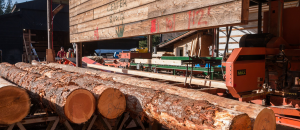 VICTORIA and the Traditional Territory of the Lekwungen Peoples – The BC Community Forest Association (BCCFA) is announcing the publication of a new guide in partnership with the Ministry of Forests, Lands, Natural Resource Operations and Rural Development (MFLNRORD) to assist community forests in assessing the feasibility of operating a micro sawmill.
VICTORIA and the Traditional Territory of the Lekwungen Peoples – The BC Community Forest Association (BCCFA) is announcing the publication of a new guide in partnership with the Ministry of Forests, Lands, Natural Resource Operations and Rural Development (MFLNRORD) to assist community forests in assessing the feasibility of operating a micro sawmill.
Micro sawmills are defined as mills that process 2,000-20,000 cubic metres per year. Micro mills present a number of opportunities including the creation of more local jobs, increased value from harvested trees, and enhanced rural economic diversification.
Building on the mandate given to MFLNRORD Minister Conroy, the BCCFA supports and encourages a move in the forest sector from volume to value by using innovative ideas to improve management, support communities, explore partnerships with First Nations and generate economic opportunities.
To get the conversation going and inspire forward-thinking practices amongst BC’s community forest agreement holders, the BCCFA created an in-depth report that offers two case studies of community forests operating micro sawmills, what is needed financially and logistically to start up a sawmill, and a list of important elements to consider in determining if this unique investment opportunity is the right fit for any given community forest.
In addition to the ability of community forests to support the value-added economy and create more jobs through their annual harvest (via log sales and initiatives such as micro sawmills), they also create value by generating more jobs than the industry average through their forestry operations. According to the BCCFA’s 2020 survey, community forests are creating 85 per cent more jobs/m3 than the industry average in their forestry, logging and support services (link to report).
“A mill at the Harrop-Procter community forest was always a part of the initial proposal for the community forest. It provides local employment, a decrease in our ecological footprint, and adds a real face to the forestry business,” says Rami Rothkop, co-founder of the Harrop-Procter Community Forest.
According to Harley Wright, chair of the Lower North Thompson Community Forest and a driving force behind their micro mill, “The mill is a way to increase employment, not just a focus on profitability. Staying in the black is important, but we also have a goal to contribute to community resiliency.”
Susan Mulkey, BCCFA Manager of Communications and Extension and lead author of the report said, “With a steady log supply coming from a community forest, micro mills present a potential opportunity for local jobs. We hope that the report will plant a seed that can grow into a valuable local asset.”


